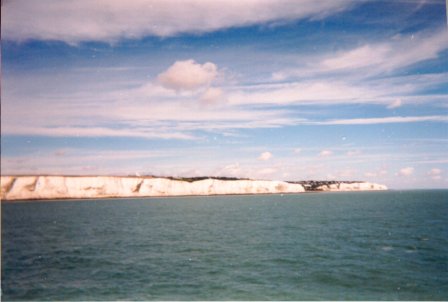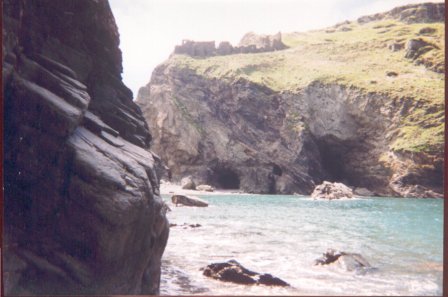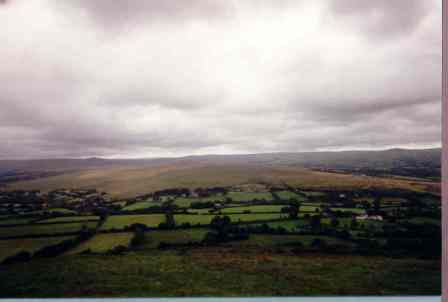
White Cliffs

White Cliffs
According to encyclopaedias, the United Kingdom—also referred to as Great Britain, the British Isles, or the "Perfidious Albion" by our Gallic cousins across the Channel—is an archipelago located northwest of Continental Europe, home to approximately 60 million people, of whom about 50 million reside in England, the third most populous island on Earth, etc.—but to me, it represents my history, my culture, my heritage, and my roots.
But why Great Britain? why Great? Great as in an empire over which the sun never set, or Great as in Britannia major ("Greater Britain"), as opposed to Britannia minor ("Lesser Britain"), the corresponding continental region, approximately the Brittany region?
It's difficult to capture thousands of years of history, culture and way of life in a handful of words and images. Personally, my favourite work on the subject is by Winston Churchill; however, even his work, "A History of the English-Speaking Peoples," only starts with Julius Caesar's invasion of Britain in 55 BC, not earlier, Stonehenge having been carbon dated back to approximately 2300 BCE.
As for me and the reason for my writing this here, I decided to take my son to England in 1999 to show him a bit of this history, culture and heritage I am so proud of and bathe him, in the space of a couple of weeks, in what is essentially his as well... a traditional father-son ritual thing, with the crossing of the Channel by ferry being the ritualistic crossing of the river Styx.
I wanted to show him some of the more remarkable, mythical and emblematic sites of England (like Stamford Bridge?), taking some ad hoc and rather banal – not yet digital – photos along the way, starting of course with the legendary White Cliffs of Dover.
The Lock and Key of the Kingdom
How to explain the White Cliffs of Dover to someone who has no conception of their historical value to the English? Contrary to the Statue of Liberty - for millions one of the first glimpses of hope after ocean voyages from around the world - the White Cliffs have, for the last thousand years at least, been a symbol of resistance and not reception, successively and successfully resisting* the Spanish, the French and, of course, the Germans twice, first the Kaiser and then the Corporal, as immortalised in several films such as the 1969 film, The Battle of Britain, starring Sir Laurence Olivier.
* but not the Dutch, who in 1667 quietly sailed up the River Medway, attacked the English fleet at Chatham and so ended the Second Anglo-Dutch War.To the English, the White Cliffs of Dover are more on a par with the Great Wall of China than the Maginot or Siegfried lines. Forever immortalised in the 1941 song "'There'll Be Blue Birds Over The White Cliffs of Dover'," the White Cliffs of Dover symbolised the impregnable fortress island the British Isles had been until the Channel Tunnel opened in 1994... not for nothing was Dover known as the Lock and Key of the Kingdom.
|
|
An unjust example of how some had to prove their worth and mettle while others could simply pick the lock of the kingdom, so to speak, and walk in. In 2004, after nearly 200 years of valiantly proving their worth and mettle for king and country, not theirs, the Gurkhas were finally granted the right to settle in the UK. Now, with the opening of the tunnel or "Chunnel" as the British call it, Paris is 2 hours away from London by train, and any asylum seeker ready to risk the ride hidden in the back of a lorry can make it into the UK.
Perhaps that's a sweeping statement, but ask the average Brit today. They would surely like to know why anyone would want to come to such a grubby, grey, overcrowded little island in the first place! No wonder that some of our cousins from across the puddle see an overloaded UK sinking slowly beneath the waves in the not too distant future, like some overcrowded Indonesian ferry.
StonehengeIEl Dorado, would willingly endure the complex customs procedures in the United States rather than continue to brave the rainy and windy English summer days on their way to the local job centre. I'm confident that some Brits would be happy to assist the visitor along the way, not out of malice or ill will but rather out of genuine goodwill and a desire to improve things for everyone. "Ah," you would think, "yet more of that world-famous 'Monty Python-ish' 2nd-degree English humour..." Yes, without a doubt, it is.
NB. A few years ago I would have hesitated writing the above, but after visiting places like Japan, Kyrgyzstan and China, I confirm that it is not second-rate nationalism but just simple pragmatism; there is a limit to everything.
Of Kings and Wizards, Myths and Legends

TintagelLiterally magical, the British Isles are full of tales, myths and legends. From the pre-druid ceremonies of Stonehenge , the legend of Arthur...and of Merlin - the legend says Merlin will awake when England will be in great peril - of Avalon, the lady of the lake and Lancelot, of Queen Boadicea, of medieval witches, bloodthirsty kings and plotting cardinals, of fairies, pixies, water sprites and giants straddling hills, of headless horses riding over Dartmoor, of demised dukes, of thousands of tales of devils and valiant vicars and parishioners, of ghosts and spirits, of unfaithful wives forever walled in towers*, of beheaded Queens in "The Tower", of knights and crusaders, of Loch Ness... and Glen Coe... but unfortunately nothing, absolutely nothing about dragon, much less a St George, Roman soldier of Palestinian origin whose legend was later appropriated by returning crusaders and who finally became patron of the English in the 12th century.
*One such tale of an unfaithful wife forever walled in a tower is the tale of Betsy Grimbal in Tavistock, Devon. The tale varies depending on the source, but the legend says that the phantom of Betsy Grimbal appears just before a national disaster or catastrophe. Tavistock, Devon, where the tale takes place, is the origin of several famous legends, such as the tale of the ghost of one Lady Howard, who rides through Tavistock in a coach drawn by headless horses preceded by a big black hound (not related to the Hound of the Baskervilles of Sir Arthur Conan Doyle). There is also the tale of the Duke of Bedford, who was found shot dead in 1953 and who haunts his old hunting lodge, Endsleigh House, at Milton Abbot, Devon. I know; I had a close encounter with his Lordship one winter's evening in 1973 while I was living there at the time.
Betsy Grimbal's Tower, TavistockEnhanced and embellished by distance, hazy memories and films such as "Chariots of Fire" or "If" each Englishman, especially emigrés and expatriates, has their own particular interpretation, perception or vision of what England is or should be. Their own personal Avalon or "New Jerusalem" that not even trips, regrettably infrequent, or even the diverse multimedia facilities available today do anything to change.
Just what is this New Jerusalem? Referred to in the Book of Revelations, New Jerusalem is literally heaven on earth. One religious movement called British Israelism, which reached its apogee towards the end of the 19th century and claimed the English were the lost tribe of Israel, appropriated the symbolism and promoted the idea and belief that God created England as the 2nd garden of Eden and all who abode therein in his image.
Apparently, God in his infinite wisdom decided not to overdo things and graced the British Isles with the weather it has: full of opposites (warm temperate weather conditions, influenced by the Gulf Stream, to the west and polar winds and Arctic conditions to the north), stereotypes (because it rains so much, the English have the greenest and best-kept lawns in the world) and contradictions (statistics show that London receives less than 650 millimetres (25.6 in) a year, which is less than Rome, Sydney or New York City).
Fortunately, a more poetic and reasonable appropriation was found thanks to the William Blake ode of the same name, "Jerusalem". It became the stirring (we don't say 'patriotic' in England, do we?) rallying hymn sung by legions of British schoolboys (your humble servant among them) and enthusiasts at the last night of the Proms, along with other typically British hymns such as Rule Britannia, Gilbert and Sullivan's H.M.S. Pinafore*, Sir Edward Elgar's Pomp and Circumstance March No. 1 (Land of Hope and Glory), Auld Lang Syne and, of course, the National Anthem.
*"For in spite of all temptations
To belong to other nations,
He remains an Englishman!
...He remains an Englishman!"
Extract from H.M.S. Pinafore by Gilbert and Sullivan
Of Origins
Forest of Dean (see map)As mentioned above, at a third of the size of France, the United Kingdom is the third most densely populated island in the world after Java and the island of Honshu in Japan. But even so, as in Japan, there are places in the country that, when you're there, you feel as though you are alone in the world. For example, standing on the cliff top at Tintagel looking out into the Atlantic on a stormy day or walking over Dartmoor, in Devon, watching the rain sweep over the remnants of ancient volcanoes long since reduced to piles of rocks, locally called tors. Suddenly the rain stops, the clouds part, the sun chases the clouds away over the fields and lights up a church tower nestling in the copse of a small valley. All at once it's a different place; the heart sings, and you know this is your own special corner of the planet, your own special vision of what England should be.

DartmoorYou might have noticed that I have a special affinity for Dartmoor. That is normal. It's where I'm from, where my roots are, and it comes from someone whose family ancestry is a mixture of Gallic, Welsh and Scottish accumulated over the years, and yet, despite years spent in continental Europe, remains very much a Briton.
Concerning character, the people from Dartmoor are hardy, solitary, self-sustaining, independent, introverted... you keep yourself to yourself and mind your business, but a fire is always lit and a meal awaits a wayfarer in need.
Dartmoor prison (with kind courtesy of... the owner)And so it was that during this 1999 trip I showed my son as much as I could of the history, culture and heritage that is his. My son is a European, a pure product of a pan-European union, and may feel at home in three or four Western European countries. But for me it's important for him to know he is at home and at ease in one specific place on this overpopulated planet, and personally I was proud when he asked me one day for a copy of my birth certificate so he could exercise his right of birth and apply for a British passport. When distances recede and cardinal points disappear (and the golden emblem on one's passport is fading from having been pulled out of pockets all too often), it's reassuring to know that there is a place on this earth you can call home and say: 'This is where my roots are and this is why I am who I am.' For me, this is Tavistock, Dartmoor, Devon, England.